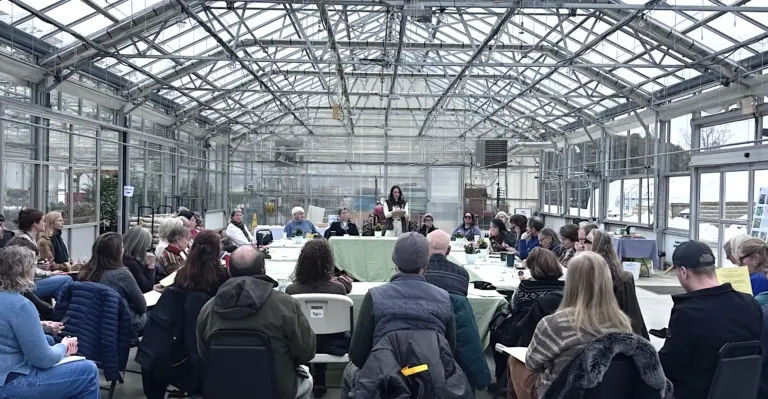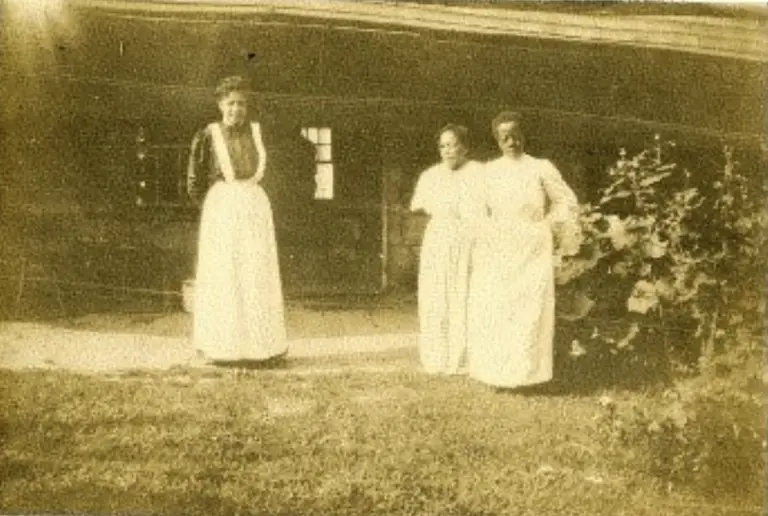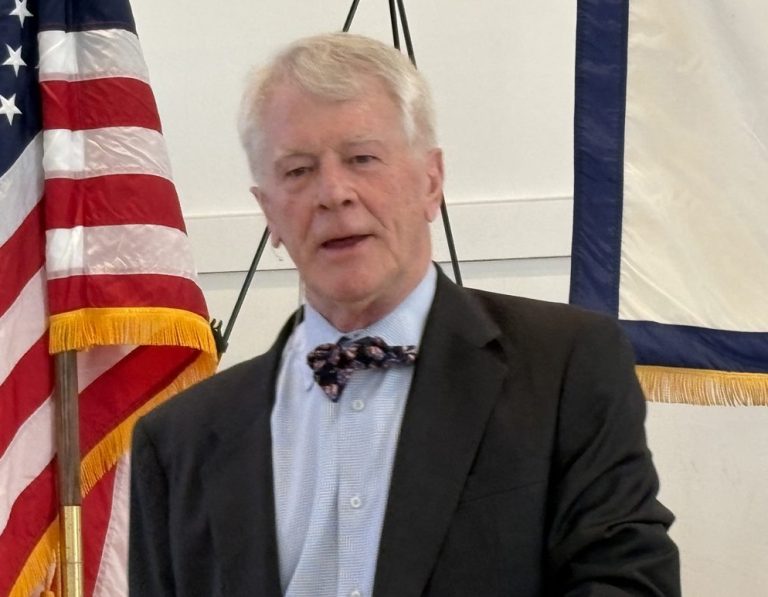By Anne W. Semmes
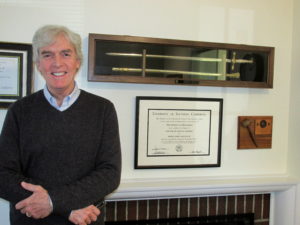
Plain to see on the sign before the offices of Dr. Ernest J. Whittle III, DDS on Sound Beach Avenue are the years he’s been in practice, from 1981 to 2021, with surely a few tooth tales to tell across 40 years. But the good doctor, at age 66, wears well those years. They have given him considerable pleasure. “The most rewarding,” he says, “is to see four or five generations of a family and have the privilege of watching them grow up from childhood to adulthood.” He surmises, “Maybe I’m doing something right if they keep coming back here generation after generation.”
Such as Ann and Jonathan “Jan” DuBois who entered Whittle’s services in 1981 at their family’s dentist office in Riverside, having then shared his good services with their (now grown) children. “He is calm, nonjudgmental, open minded, professional without being cold, very competent and truly present,” offers Ann DuBois.
It was those dexterous hands that led the way. As a teenager dentistry was not on Whittle’s radar. But a family dentist and friend of his parents came upon him building a model of his father’s WWII fighter plane. “You’ve got a steady hand when you paint,” observed the family dentist. “You’d be a good dentist.” How would he like a tour of that dentist’s dental school “to see what it’s all about?” “This is a pretty nice gig,” concluded the young Whittle. Four years of college followed, then four years at that dental school. His first gig was in Riverside. He bought his Sound Beach office site in 1987.
He interrupts his tooth telling with an alert, “I hear outside our landscaper and he’s a fine guy. He came here from Central America. He’s got his citizenship and he’s paying his taxes. But when he came here, his teeth were terrible. He grew up in a rural area…And we made these restorations for him. Now he has this beautiful smile and he’s able to do this work. And he said, ‘This is great, because now I can talk to people as a businessman here in Fairfield County. And I can look at them and smile at them.’
Game changers
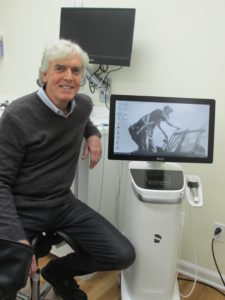
Whittle’s practice across 40 years has included significant game changers in the field of dentistry. The first was the arrival of dental implants. “It was this huge paradigm shift,” he says, “where instead of replacing teeth with removable bridge work or fixed bridge work, we can now restore individual teeth using titanium implants.” And then came the advent of digital technology “that allows dentists to fabricate crowns and bridges and veneers,” he tells, “and implant crowns in a very small space of time at their own office without having to go to a dental lab, in many instances. Now we can do a crown start to finish in two hours.”
Whittle also embraced a procedure to prevent cavities by treating young kids’ teeth with a sealant. “In the 1960s or 70s,” he notes, “they realized that the greatest percentage of cavities that occur in our teeth when we’re kids occur on the chewing surfaces of our teeth. When our teeth come into our mouths, they have very deep pits and fissures and grooves. And these tend to catch food in the little cracks where they can’t be brushed out even if the little kids brush. So, someone came up with the bright idea of instead of just waiting for these grooves and pits and fissures to decay and then fill them, let’s put something in there that will prevent the food from accumulating in there and prevent the number one type of cavity that we see in people.”
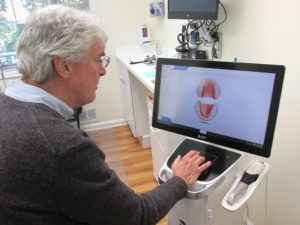
And now there’s that new tool for those kids who “just don’t brush,” says Whittle, the electric toothbrush. “They’re really quite good. And now some of these electric brushes have apps on the phone, so the kid after they brush can see where they’re missing on the phone. Having this app all of a sudden makes brushing something cool.”
Best practices of dental care
So, this reporter is encouraging her granddaughter to use dental floss. How prevalent does he see its use? Not prevalent. “Maybe it’s because it isn’t high tech – you’re just dragging a string between your teeth. But it really is one of the most effective things that you can do. And it’s very smart of you to get your granddaughter to do it when she’s young. Because if you just make it part of the whole routine, from day one, they just integrate it into their whole personal hygiene program. I don’t think there’s any single thing you can do that’s more important if you’re trying to prevent cavities between the teeth and periodontal disease.”
By college age Whittle has seen a certain fall off of dental hygiene in his young clients. “They come back after freshman year with like, 10 cavities. And then the parents yell at me like what happened? I know what happened – they were out partying, and they forgot to brush before they went to bed. They had no one standing over them to make them do it.”
Instilling dental hygiene should begin age two or three says Whittle. “What children at that age want to do is to be grown up. Look at me, I can do this by myself. That’s a big deal when you’re in preschool. So, if you’re getting them into that habit, if they see you or the parents brushing and flossing every night, it just becomes a routine. That’s what you do when you’re grown up.”
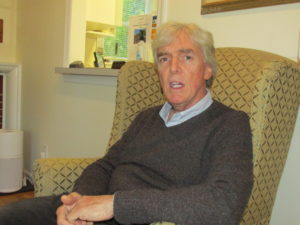
And avoid those sugar filled soft drinks! “The last few generations have been sold on the fact that you’ve got to drink Coke or Pepsi or Mountain Dew. Those are horrible if they have sugar in them. But even if they don’t have sugar, if they’re sugar free, there’s also side effects from drinking sugar free. Our ancestors drank water for thousands of years and they were just fine.” But he adds, “No matter how high of a sugar content you have, if you brush right afterwards, you’re fine. It’s the amount of time that it’s left in contact with your teeth that really causes the damage.”
Teeth longevity
So, with all these advances in dental care, are we keeping our teeth longer? “Well, a lot of it has to do with genetics. There are people who come in and they’ll have a beautiful set of teeth and I’ll say you’re really very lucky. My father had all his teeth until he died at 98. So, there’s a lot of genetics here.
“You can keep your teeth until you’re over 100 if you take care of them properly. It’s like a house or a car. You see these guys that have this car they’ve been babying since they were in high school. They did all the things that the car needed to be done. My father grew up in the Great Depression as a son of an immigrant, and he brushed his teeth like crazy because they didn’t have much access to dental care. “
But there was that time his dad fell toward the end of his life in Florida where he lived. “He knocked out his two front teeth, sheared them off at the gum line. So, I tried to figure out what to do to help him -all his other teeth were fine.” The needed equipment was sent down – his son arrived at the ready. “I treated him in his condo with his dog on his lap. And I got all his teeth back in.”
Marking those four decades of treating surely thousands of patients, Whittle feels full of gratitude. “I have patients coming in and they go you’re not retiring, right? They threaten me with bodily harm if I retire. So, for my own health, I have to keep practicing!”
He likes looking back on those early days when he first got out of dental school, “when I was 26,” he says, and met his patient Alice DuBois, “when she was four or five years old, and she was riding the garage door up and down and hit her tooth. And now she’s got to be 45. But that’s the cool thing. You remember this little kid riding on the garage door – such a nice family. But very typical of the families that I’ve been blessed with. I think about the 40 years. Like my father used to say, don’t do the math, because if you do the math, you’ll start to freak yourself out.”

